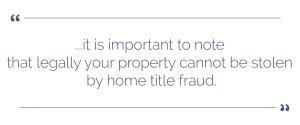

Updated on March 26, 2024
Home title fraud is a crime that occurs when someone fraudulently replaces your name on the title to your property with their name. Home title fraud is gaining traction as information about people becomes more accessible online. It is difficult to know how widespread this crime is because authorities have not separated home title fraud into its own category. Home title fraud, title theft, and deed fraud all mean the same.
Property transfers hands through a deed that names the grantee and is signed by the true owner/grantor under the presence of a notary. Before the grantor and notary sign the deed, the notary will ask the grantor to produce proper identification. Thus, to carry out title fraud for homes, the fraudster will first need to gather your personal information.

There are many consequences of home title fraud. However, it is important to note that legally your property cannot be stolen by home title fraud. That does not lessen the seriousness of this crime.
Upon perfecting the home title fraud, the fraudster stands to gain a fortune. For example, with record title to your property, the fraudster can either sell your property to a third party or steal money from unsuspecting lenders by “borrowing” against the equity of the property. The Real Estate fraudster then escapes with the money and leaves the innocent homeowner to deal with the fallout. This is where it can get very expensive for the true owner.
Best case, the defrauded buyer or lender accepts your side of the story and readily agree to disclaim their interest to the property. However, the chances of that happening is rare. Worst case, and unfortunately the usual case, the innocent homeowner has to clear his or her name to the property by filing a civil action. The good news is that once you get a court to adjudicate title in your name, you will not be held responsible for having to pay any loan that the fraudster took out or be liable to any third party who “purchased” the property from the fraudster.
The bad news is that it is very expensive to prove your case in court. Litigation is lengthy and will most certainly require one or more handwriting experts to prove that someone forged your signature on the deed.
You can either directly and indirectly learn that you are a potential victim of home title fraud. Some direct indications of home title fraud involve being caught in foreclosure proceedings even though you have paid off your mortgage. If you hold vacant property, another direct sign is if your vacant property is actually being occupied.
Indirect signs can also alert you to home title fraud. Many times, the fraudsters will change your address where you receive documents from the tax collector’s office or utility companies. Thus, an indirect sign of possible home title theft is failing to receive your property tax bill. Or, you may have missed utility bills that you otherwise would have received.
On the flip side, if the property is vacant, an indirect sign of home title fraud is actually receiving a utility bill, or a utility bill with usage that is strikingly higher. For those of you that rent property, perhaps your tenants will suddenly stop paying you rent. If this happens, it could be that your tenants are paying rent to someone else.
Fortunately, there are solutions for dealing with this type of real estate fraud. Often times the deeds are void because a fraudulent or forged deed is void even if there is a subsequent bonafide purchaser for value. At Schorr Law, have seen some of the most unimaginable examples of real estate title fraud – but there is always a solution.
For help with your home title fraud, or general real estate fraud matter, please contact our real estate attorneys at Schorr Law today. You can call us, send us an email, or message us through our contact form. (310) 954-1877 | [email protected] | Contact Us Form